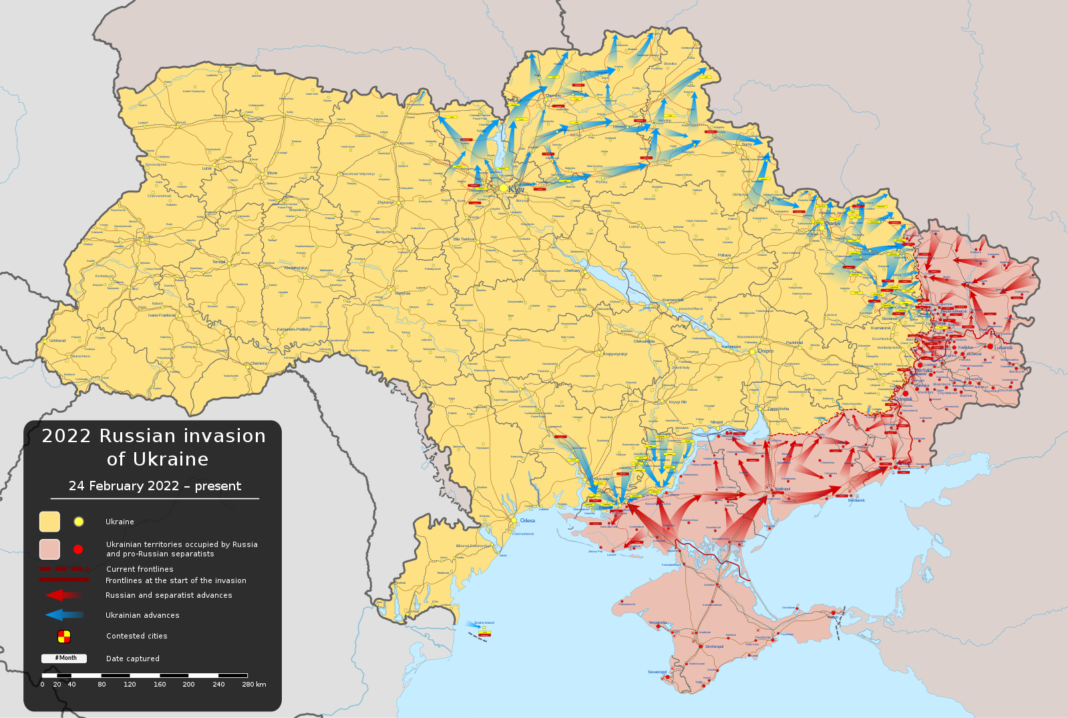The weekly editorial update on the Russia-Ukraine war by our director, Raffaele Crocco.

In this fifty-fourth week since the Russian invasion of Ukraine, the key word is just one: Bakhmut. Around and now inside the city in the east of the country, a battle is being fought that is not decisive, but important – and not only for the military aspect, say observers and analysts alike.
The battle is yet another bloodbath in this war, which has already cost – conservative estimations claim – 200,000 lives. The Russians on the offensive are losing, according to some rumours, 500 men a day between dead and wounded. The Ukrainian army is responding by throwing poorly trained and poorly protected artillery and armoured units into the front line. It is a slaughter. Corpses remain on the battlefield. No one amongst the attackers and defenders has time to pick them up.
Military observers reiterate the concept: the conquest of Bakhmut for the Russians would be important, but not enough to think of turning the war in their favour. To be really effective, the offensive would have to continue towards the cities of Sloviansk and Kramatorsk – and this is far from easy. The area is not a nerve centre, and the city is so devastated that it cannot even serve as a logistical base. On the Ukrainian side, the loss of the city would be painful, but would not compromise overall resilience at the moment. Yet, President Zelensky has ordered the ‘defence to the bitter end’, even going against his own General Staff, which is more inclined to a tactical retreat.
Explaining the reasons for such fury and determination is US Secretary of Defence, Lloyd Austin, together with the think tank ISW. Basically, they argue that the battle for Bakhmut has become strategically significant due to the composition of Russian forces in the area. Leading the offensive are the elite elements of Wagner, the mercenary organisation operating on behalf of Moscow. The city’s civilian resistance, with its many casualties, is mowing down the mercenary troop and another Russian elite corps: the airborne troops. These elements, analysts say, are difficult to replace and could degrade the operational capability of the Kremlin’s armed forces.
There is also a political aspect, underlined by an ISW note: the battle is damaging the reputation and power in Russia of Wagner’s boss, Prigozhin. ISW writes how this ‘would be an important achievement from a long-term perspective, to restore common sense in Russia’. There seem to be some signs of this. The independent Russian newspaper Verstka has claimed in recent days that the country’s media have received orders from the Kremlin to silence the head of Wagner, because of his continuing disagreement with Moscow’s military leadership over the way the war in Ukraine is being conducted. The Wagner chief has announced the taking of some villages in the western periphery. It is reasonable to think that the Ukrainians may slowly fall back, fighting house by house, to the city centre. Ukrainian President Zelensky called on Europe to speed up arms supplies. “We need ammunition and tanks like Leopards,” he said. They will come. Europe and Nato are finalising the protocols and funding needed to supply Kiev. Poland is also willing to immediately hand over its old MIg29, Soviet-era air superiority fighters, to Ukraine. ‘Those planes are needed now,’ said Polish President Andrzej Duda, ‘and the Ukrainians would be able to use them immediately.
Cover image: Map of Russian invasion of Ukraine, Wikimedia – credit to the respective owners
























